Math Homework: Calculus, Algebra, Statistics and Complex Numbers
VerifiedAdded on 2023/06/07
|26
|3843
|471
Homework Assignment
AI Summary
This mathematics assignment solution covers a wide range of topics, including trigonometric functions, calculus (derivatives, integration, and applications), algebra (quadratic equations and partial fractions), statistics (mean value, RMS), and complex numbers. The assignment includes detailed step-by-step solutions to problems involving finding parameters of cosine functions, analyzing currents, determining turning points and points of inflection, solving exponential and logarithmic equations, calculating arc length, and analyzing trendlines. The solution also addresses complex number problems using the quadratic formula. The student provides comprehensive solutions and explanations for each question.

Mathematics Assignment
Student Name
Institution
Date of submission
Student Name
Institution
Date of submission
Paraphrase This Document
Need a fresh take? Get an instant paraphrase of this document with our AI Paraphraser
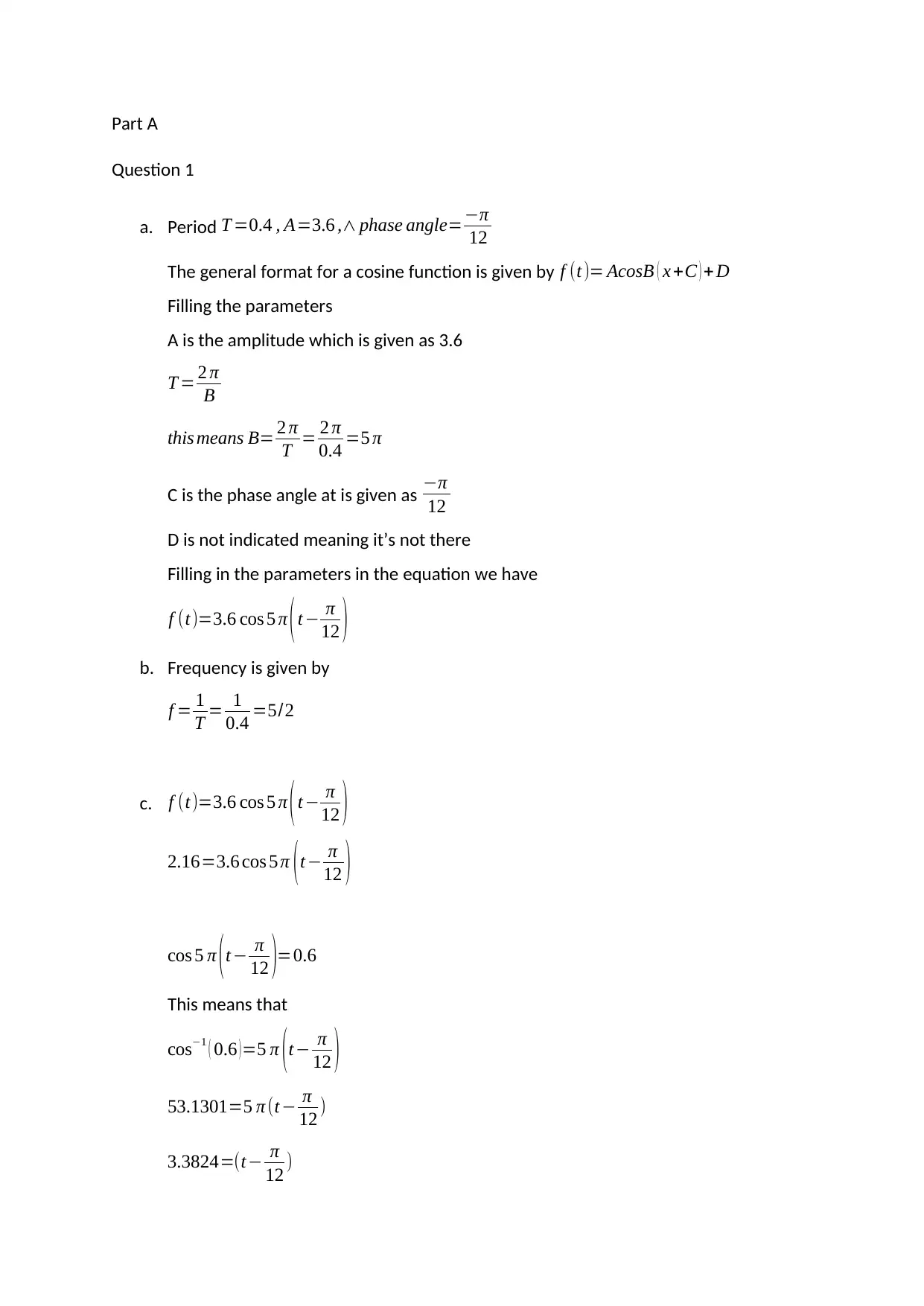
Part A
Question 1
a. Period T =0.4 , A=3.6 ,∧ phase angle=−π
12
The general format for a cosine function is given by f (t)= AcosB ( x +C ) + D
Filling the parameters
A is the amplitude which is given as 3.6
T = 2 π
B
this means B= 2 π
T = 2 π
0.4 =5 π
C is the phase angle at is given as −π
12
D is not indicated meaning it’s not there
Filling in the parameters in the equation we have
f (t)=3.6 cos 5 π (t− π
12 )
b. Frequency is given by
f = 1
T = 1
0.4 =5/2
c. f (t)=3.6 cos 5 π (t− π
12 )
2.16=3.6 cos 5 π (t− π
12 )
cos 5 π (t− π
12 )=0.6
This means that
cos−1 ( 0.6 )=5 π (t− π
12 )
53.1301=5 π (t− π
12 )
3.3824=(t− π
12 )
Question 1
a. Period T =0.4 , A=3.6 ,∧ phase angle=−π
12
The general format for a cosine function is given by f (t)= AcosB ( x +C ) + D
Filling the parameters
A is the amplitude which is given as 3.6
T = 2 π
B
this means B= 2 π
T = 2 π
0.4 =5 π
C is the phase angle at is given as −π
12
D is not indicated meaning it’s not there
Filling in the parameters in the equation we have
f (t)=3.6 cos 5 π (t− π
12 )
b. Frequency is given by
f = 1
T = 1
0.4 =5/2
c. f (t)=3.6 cos 5 π (t− π
12 )
2.16=3.6 cos 5 π (t− π
12 )
cos 5 π (t− π
12 )=0.6
This means that
cos−1 ( 0.6 )=5 π (t− π
12 )
53.1301=5 π (t− π
12 )
3.3824=(t− π
12 )
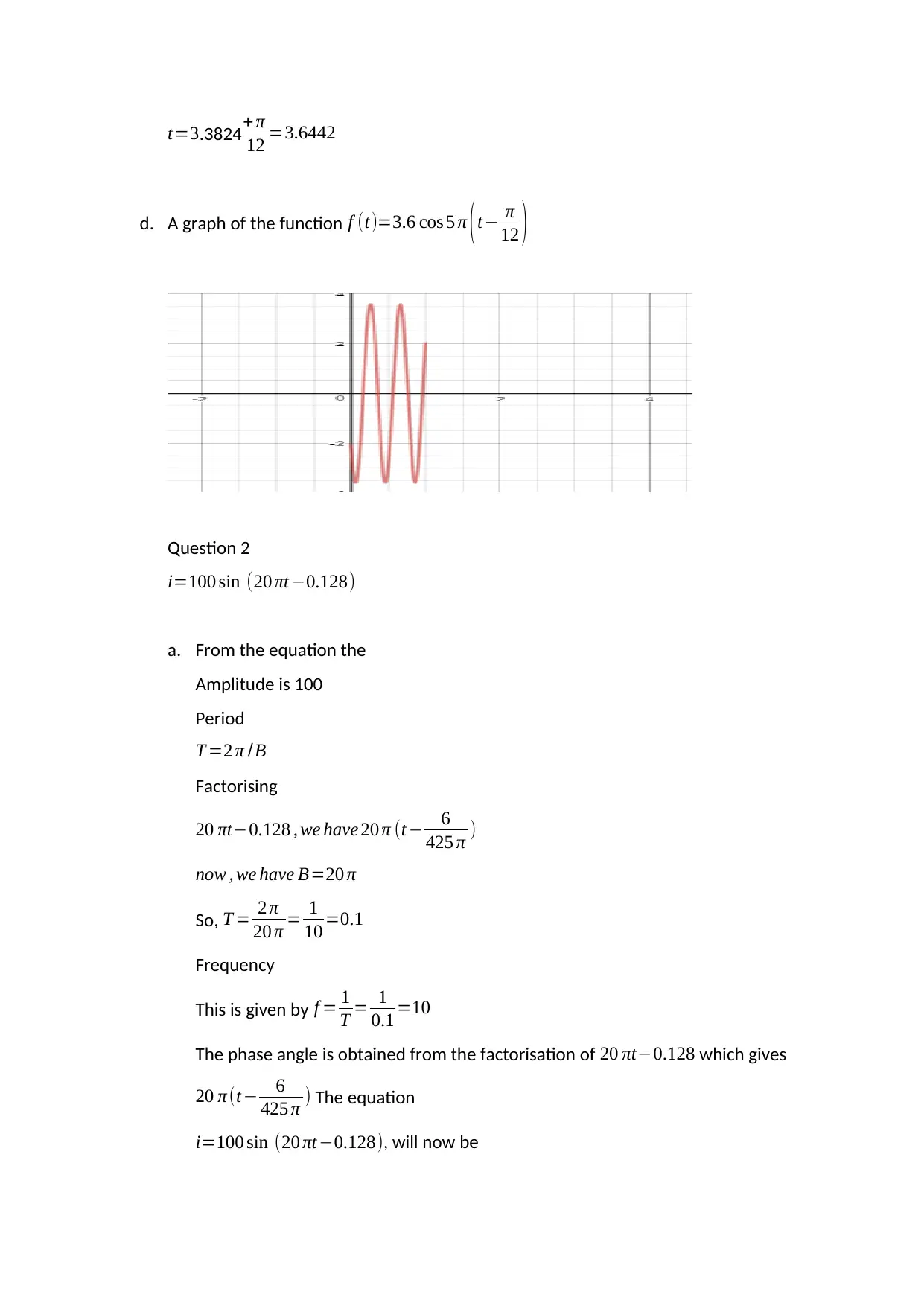
t=3.3824+ π
12 =3.6442
d. A graph of the function f (t)=3.6 cos 5 π (t− π
12 )
Question 2
i=100 sin (20 πt−0.128)
a. From the equation the
Amplitude is 100
Period
T =2 π /B
Factorising
20 πt−0.128 , we have 20 π (t − 6
425 π )
now , we have B=20 π
So, T = 2 π
20 π = 1
10 =0.1
Frequency
This is given by f = 1
T = 1
0.1 =10
The phase angle is obtained from the factorisation of 20 πt−0.128 which gives
20 π (t − 6
425 π ) The equation
i=100 sin (20 πt−0.128), will now be
12 =3.6442
d. A graph of the function f (t)=3.6 cos 5 π (t− π
12 )
Question 2
i=100 sin (20 πt−0.128)
a. From the equation the
Amplitude is 100
Period
T =2 π /B
Factorising
20 πt−0.128 , we have 20 π (t − 6
425 π )
now , we have B=20 π
So, T = 2 π
20 π = 1
10 =0.1
Frequency
This is given by f = 1
T = 1
0.1 =10
The phase angle is obtained from the factorisation of 20 πt−0.128 which gives
20 π (t − 6
425 π ) The equation
i=100 sin (20 πt−0.128), will now be
⊘ This is a preview!⊘
Do you want full access?
Subscribe today to unlock all pages.

Trusted by 1+ million students worldwide
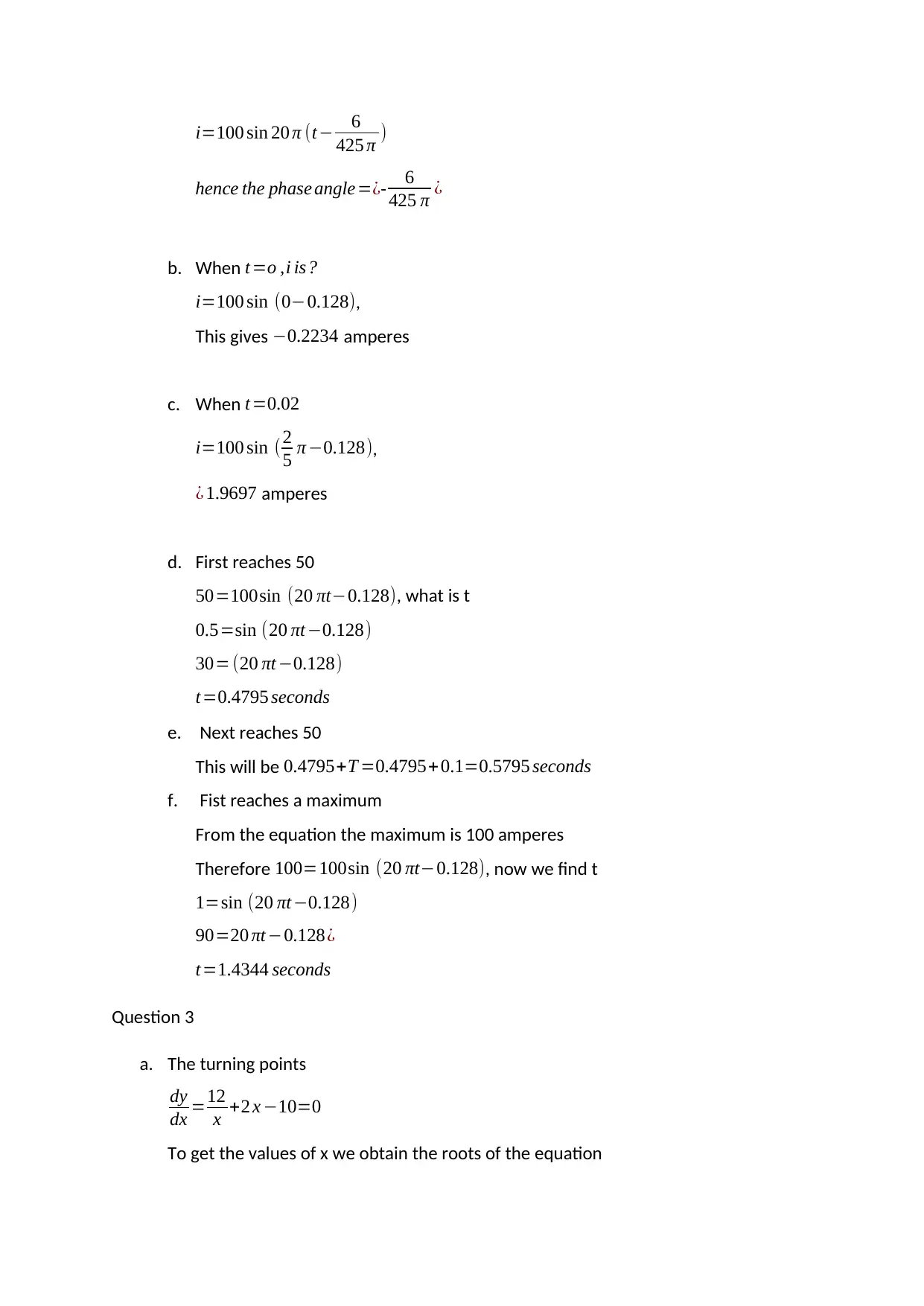
i=100 sin 20 π (t− 6
425 π )
hence the phase angle=¿- 6
425 π ¿
b. When t=o ,i is?
i=100 sin (0−0.128),
This gives −0.2234 amperes
c. When t=0.02
i=100 sin (2
5 π −0.128),
¿ 1.9697 amperes
d. First reaches 50
50=100sin (20 πt−0.128), what is t
0.5=sin (20 πt−0.128)
30= (20 πt −0.128)
t=0.4795 seconds
e. Next reaches 50
This will be 0.4795+T =0.4795+0.1=0.5795 seconds
f. Fist reaches a maximum
From the equation the maximum is 100 amperes
Therefore 100=100sin (20 πt−0.128), now we find t
1=sin (20 πt−0.128)
90=20 πt−0.128¿
t=1.4344 seconds
Question 3
a. The turning points
dy
dx =12
x +2 x −10=0
To get the values of x we obtain the roots of the equation
425 π )
hence the phase angle=¿- 6
425 π ¿
b. When t=o ,i is?
i=100 sin (0−0.128),
This gives −0.2234 amperes
c. When t=0.02
i=100 sin (2
5 π −0.128),
¿ 1.9697 amperes
d. First reaches 50
50=100sin (20 πt−0.128), what is t
0.5=sin (20 πt−0.128)
30= (20 πt −0.128)
t=0.4795 seconds
e. Next reaches 50
This will be 0.4795+T =0.4795+0.1=0.5795 seconds
f. Fist reaches a maximum
From the equation the maximum is 100 amperes
Therefore 100=100sin (20 πt−0.128), now we find t
1=sin (20 πt−0.128)
90=20 πt−0.128¿
t=1.4344 seconds
Question 3
a. The turning points
dy
dx =12
x +2 x −10=0
To get the values of x we obtain the roots of the equation
Paraphrase This Document
Need a fresh take? Get an instant paraphrase of this document with our AI Paraphraser
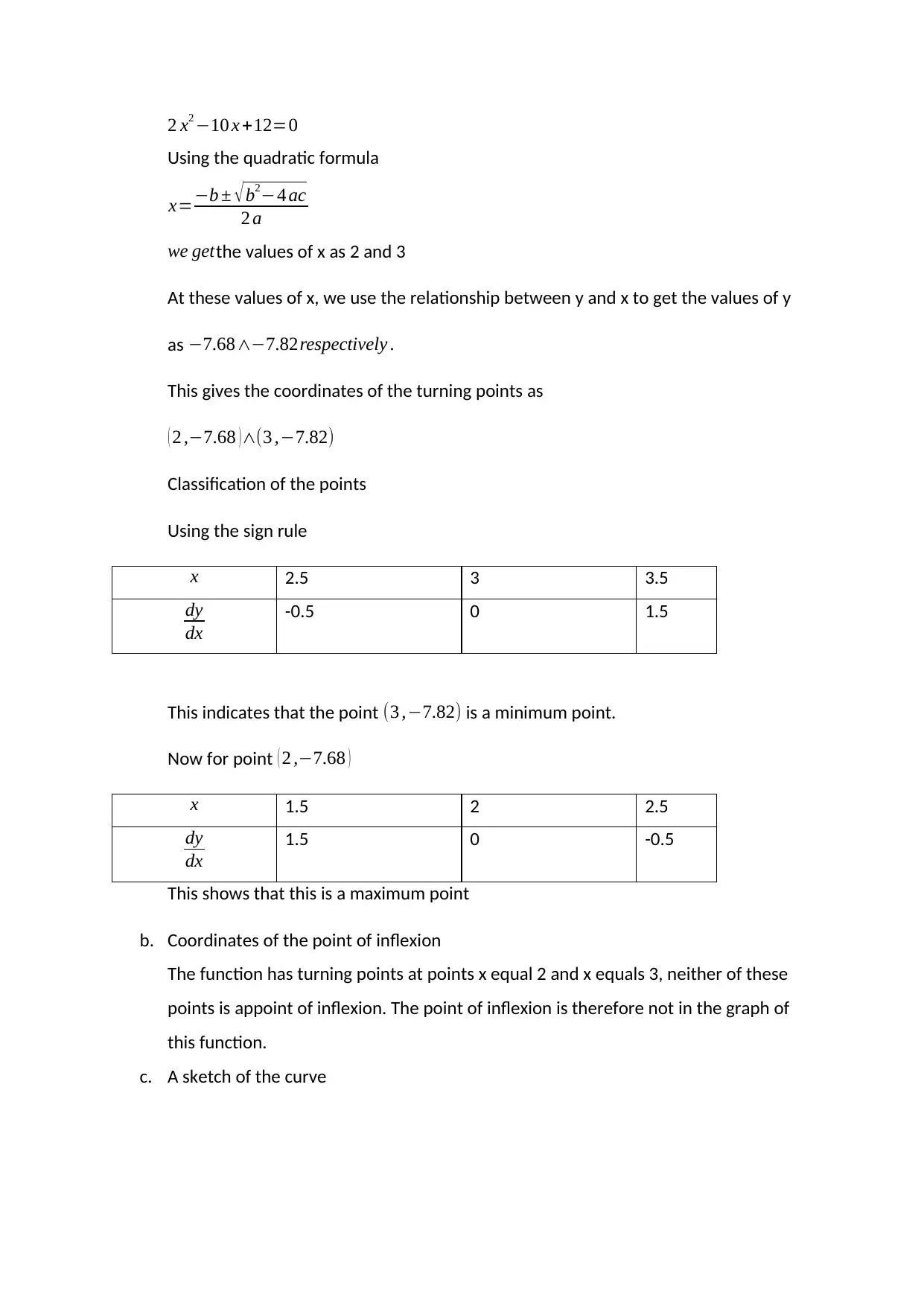
2 x2 −10 x +12=0
Using the quadratic formula
x=−b ± √ b2−4 ac
2 a
we getthe values of x as 2 and 3
At these values of x, we use the relationship between y and x to get the values of y
as −7.68∧−7.82respectively .
This gives the coordinates of the turning points as
( 2 ,−7.68 )∧(3 ,−7.82)
Classification of the points
Using the sign rule
x 2.5 3 3.5
dy
dx
-0.5 0 1.5
This indicates that the point (3 ,−7.82) is a minimum point.
Now for point ( 2 ,−7.68 )
x 1.5 2 2.5
dy
dx
1.5 0 -0.5
This shows that this is a maximum point
b. Coordinates of the point of inflexion
The function has turning points at points x equal 2 and x equals 3, neither of these
points is appoint of inflexion. The point of inflexion is therefore not in the graph of
this function.
c. A sketch of the curve
Using the quadratic formula
x=−b ± √ b2−4 ac
2 a
we getthe values of x as 2 and 3
At these values of x, we use the relationship between y and x to get the values of y
as −7.68∧−7.82respectively .
This gives the coordinates of the turning points as
( 2 ,−7.68 )∧(3 ,−7.82)
Classification of the points
Using the sign rule
x 2.5 3 3.5
dy
dx
-0.5 0 1.5
This indicates that the point (3 ,−7.82) is a minimum point.
Now for point ( 2 ,−7.68 )
x 1.5 2 2.5
dy
dx
1.5 0 -0.5
This shows that this is a maximum point
b. Coordinates of the point of inflexion
The function has turning points at points x equal 2 and x equals 3, neither of these
points is appoint of inflexion. The point of inflexion is therefore not in the graph of
this function.
c. A sketch of the curve
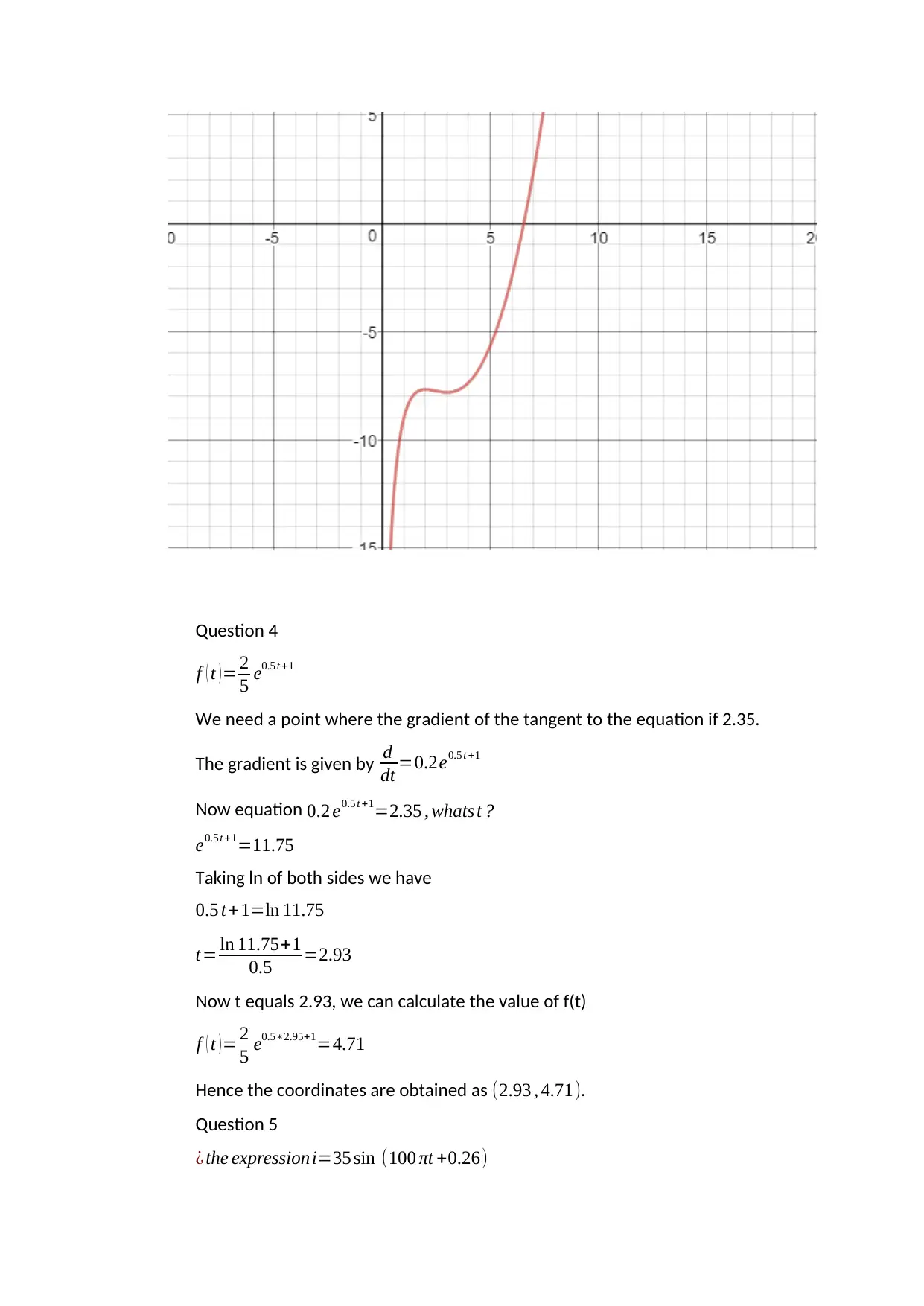
Question 4
f ( t )= 2
5 e0.5 t +1
We need a point where the gradient of the tangent to the equation if 2.35.
The gradient is given by d
dt =0.2e0.5 t +1
Now equation 0.2 e0.5 t +1=2.35 , whats t ?
e0.5 t +1=11.75
Taking ln of both sides we have
0.5 t+ 1=ln 11.75
t= ln 11.75+1
0.5 =2.93
Now t equals 2.93, we can calculate the value of f(t)
f ( t )= 2
5 e0.5∗2.95+1=4.71
Hence the coordinates are obtained as (2.93 , 4.71).
Question 5
¿ the expressioni=35 sin (100 πt +0.26)
f ( t )= 2
5 e0.5 t +1
We need a point where the gradient of the tangent to the equation if 2.35.
The gradient is given by d
dt =0.2e0.5 t +1
Now equation 0.2 e0.5 t +1=2.35 , whats t ?
e0.5 t +1=11.75
Taking ln of both sides we have
0.5 t+ 1=ln 11.75
t= ln 11.75+1
0.5 =2.93
Now t equals 2.93, we can calculate the value of f(t)
f ( t )= 2
5 e0.5∗2.95+1=4.71
Hence the coordinates are obtained as (2.93 , 4.71).
Question 5
¿ the expressioni=35 sin (100 πt +0.26)
⊘ This is a preview!⊘
Do you want full access?
Subscribe today to unlock all pages.

Trusted by 1+ million students worldwide
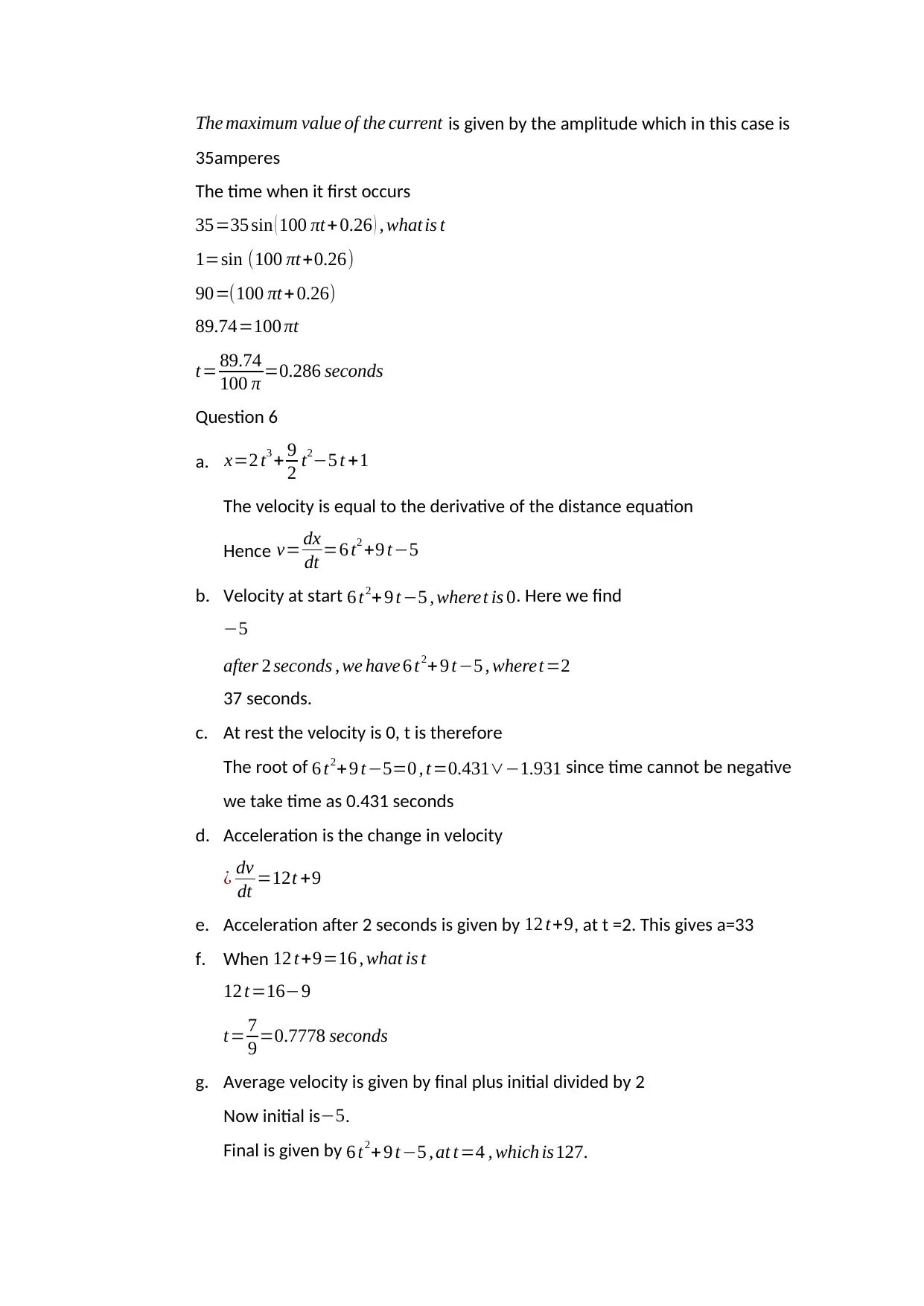
The maximum value of the current is given by the amplitude which in this case is
35amperes
The time when it first occurs
35=35 sin ( 100 πt+ 0.26 ) , what is t
1=sin (100 πt+0.26)
90=(100 πt+ 0.26)
89.74=100 πt
t= 89.74
100 π =0.286 seconds
Question 6
a. x=2 t3 + 9
2 t2−5 t +1
The velocity is equal to the derivative of the distance equation
Hence v= dx
dt =6 t2 +9 t−5
b. Velocity at start 6 t2+9 t−5 , wheret is 0. Here we find
−5
after 2 seconds , we have 6 t2+ 9 t−5 , wheret =2
37 seconds.
c. At rest the velocity is 0, t is therefore
The root of 6 t2+9 t−5=0 , t=0.431∨−1.931 since time cannot be negative
we take time as 0.431 seconds
d. Acceleration is the change in velocity
¿ dv
dt =12t +9
e. Acceleration after 2 seconds is given by 12 t+9, at t =2. This gives a=33
f. When 12 t+9=16 , what is t
12 t=16−9
t= 7
9 =0.7778 seconds
g. Average velocity is given by final plus initial divided by 2
Now initial is−5.
Final is given by 6 t2+ 9 t−5 , at t=4 , which is127.
35amperes
The time when it first occurs
35=35 sin ( 100 πt+ 0.26 ) , what is t
1=sin (100 πt+0.26)
90=(100 πt+ 0.26)
89.74=100 πt
t= 89.74
100 π =0.286 seconds
Question 6
a. x=2 t3 + 9
2 t2−5 t +1
The velocity is equal to the derivative of the distance equation
Hence v= dx
dt =6 t2 +9 t−5
b. Velocity at start 6 t2+9 t−5 , wheret is 0. Here we find
−5
after 2 seconds , we have 6 t2+ 9 t−5 , wheret =2
37 seconds.
c. At rest the velocity is 0, t is therefore
The root of 6 t2+9 t−5=0 , t=0.431∨−1.931 since time cannot be negative
we take time as 0.431 seconds
d. Acceleration is the change in velocity
¿ dv
dt =12t +9
e. Acceleration after 2 seconds is given by 12 t+9, at t =2. This gives a=33
f. When 12 t+9=16 , what is t
12 t=16−9
t= 7
9 =0.7778 seconds
g. Average velocity is given by final plus initial divided by 2
Now initial is−5.
Final is given by 6 t2+ 9 t−5 , at t=4 , which is127.
Paraphrase This Document
Need a fresh take? Get an instant paraphrase of this document with our AI Paraphraser
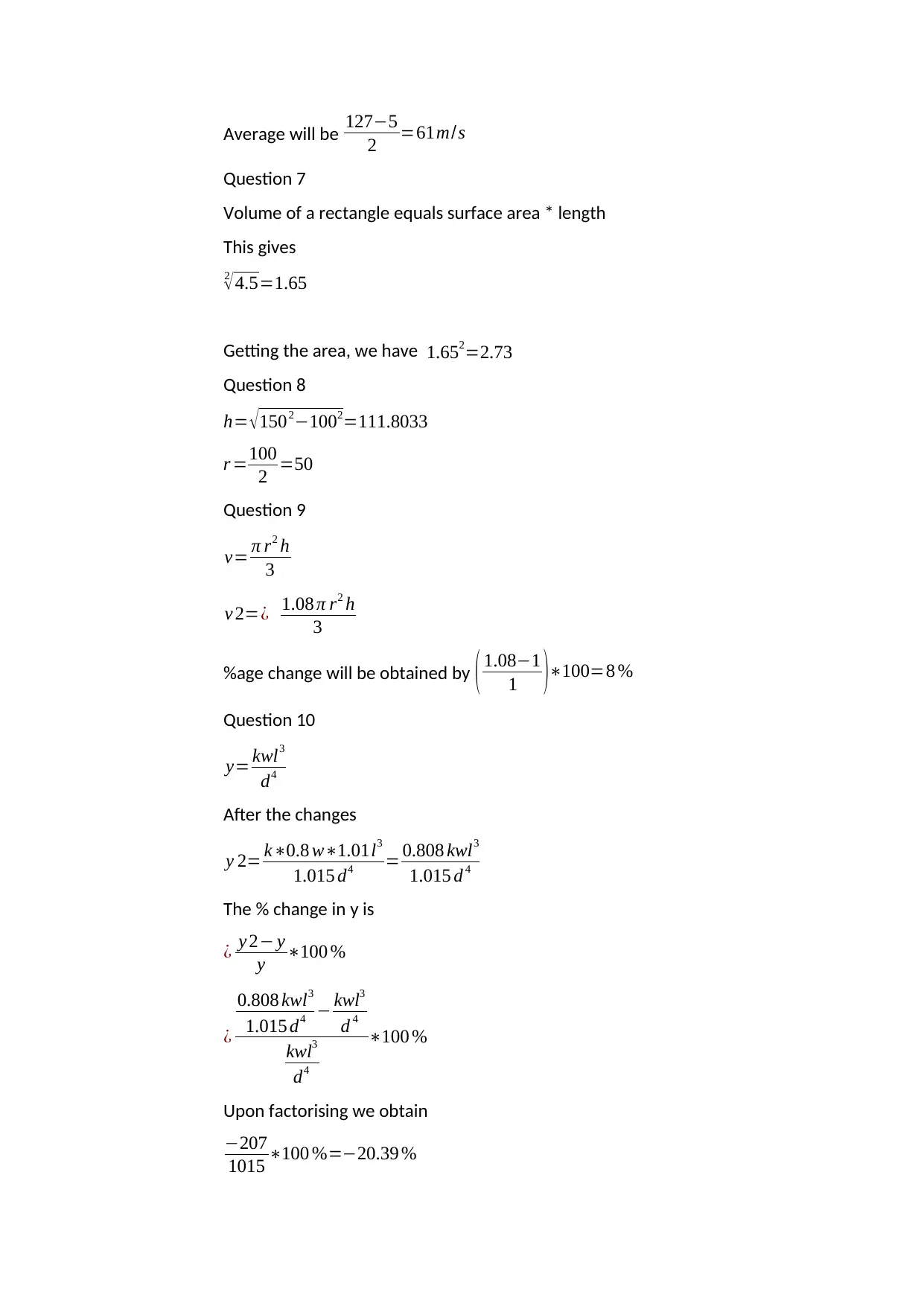
Average will be 127−5
2 =61m/s
Question 7
Volume of a rectangle equals surface area * length
This gives
2
√4.5=1.65
Getting the area, we have 1.652=2.73
Question 8
h= √1502−1002=111.8033
r =100
2 =50
Question 9
v= π r2 h
3
v 2=¿ 1.08 π r2 h
3
%age change will be obtained by ( 1.08−1
1 )∗100=8 %
Question 10
y= kwl3
d4
After the changes
y 2= k∗0.8 w∗1.01l3
1.015 d4 = 0.808 kwl3
1.015 d 4
The % change in y is
¿ y 2− y
y ∗100 %
¿
0.808 kwl3
1.015 d4 − kwl3
d 4
kwl3
d4
∗100 %
Upon factorising we obtain
−207
1015 ∗100 %=−20.39 %
2 =61m/s
Question 7
Volume of a rectangle equals surface area * length
This gives
2
√4.5=1.65
Getting the area, we have 1.652=2.73
Question 8
h= √1502−1002=111.8033
r =100
2 =50
Question 9
v= π r2 h
3
v 2=¿ 1.08 π r2 h
3
%age change will be obtained by ( 1.08−1
1 )∗100=8 %
Question 10
y= kwl3
d4
After the changes
y 2= k∗0.8 w∗1.01l3
1.015 d4 = 0.808 kwl3
1.015 d 4
The % change in y is
¿ y 2− y
y ∗100 %
¿
0.808 kwl3
1.015 d4 − kwl3
d 4
kwl3
d4
∗100 %
Upon factorising we obtain
−207
1015 ∗100 %=−20.39 %
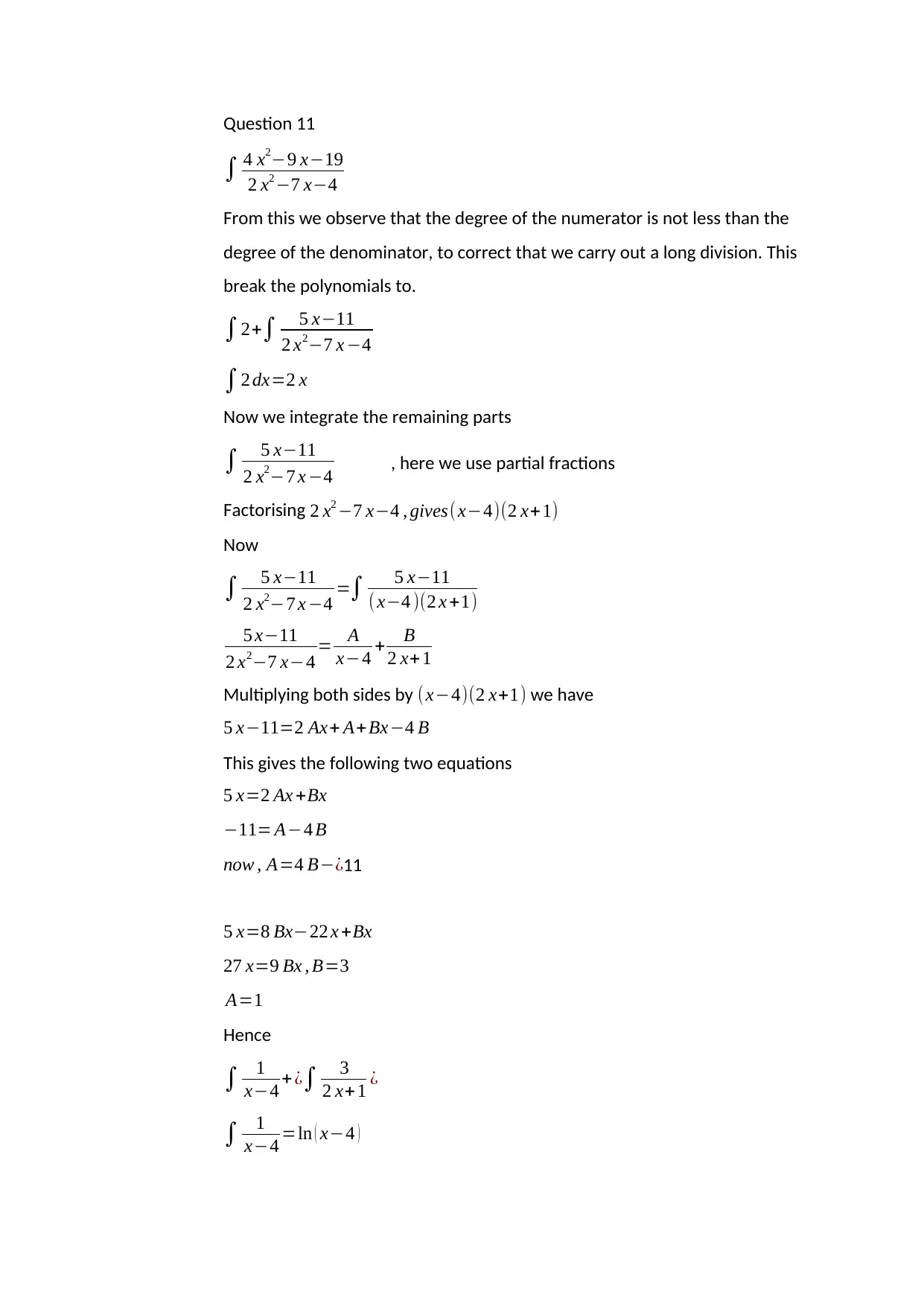
Question 11
∫ 4 x2−9 x−19
2 x2 −7 x−4
From this we observe that the degree of the numerator is not less than the
degree of the denominator, to correct that we carry out a long division. This
break the polynomials to.
∫2+∫ 5 x−11
2 x2−7 x −4
∫2 dx=2 x
Now we integrate the remaining parts
∫ 5 x−11
2 x2−7 x −4 , here we use partial fractions
Factorising 2 x2 −7 x−4 , gives(x−4)(2 x+1)
Now
∫ 5 x−11
2 x2−7 x −4 =∫ 5 x−11
( x−4 )(2 x +1)
5 x−11
2 x2−7 x−4 = A
x−4 + B
2 x+ 1
Multiplying both sides by (x−4)(2 x+1) we have
5 x−11=2 Ax+ A+ Bx−4 B
This gives the following two equations
5 x=2 Ax +Bx
−11= A−4 B
now , A=4 B−¿11
5 x=8 Bx−22 x +Bx
27 x=9 Bx , B=3
A=1
Hence
∫ 1
x−4 + ¿∫ 3
2 x+ 1 ¿
∫ 1
x−4 =ln ( x−4 )
∫ 4 x2−9 x−19
2 x2 −7 x−4
From this we observe that the degree of the numerator is not less than the
degree of the denominator, to correct that we carry out a long division. This
break the polynomials to.
∫2+∫ 5 x−11
2 x2−7 x −4
∫2 dx=2 x
Now we integrate the remaining parts
∫ 5 x−11
2 x2−7 x −4 , here we use partial fractions
Factorising 2 x2 −7 x−4 , gives(x−4)(2 x+1)
Now
∫ 5 x−11
2 x2−7 x −4 =∫ 5 x−11
( x−4 )(2 x +1)
5 x−11
2 x2−7 x−4 = A
x−4 + B
2 x+ 1
Multiplying both sides by (x−4)(2 x+1) we have
5 x−11=2 Ax+ A+ Bx−4 B
This gives the following two equations
5 x=2 Ax +Bx
−11= A−4 B
now , A=4 B−¿11
5 x=8 Bx−22 x +Bx
27 x=9 Bx , B=3
A=1
Hence
∫ 1
x−4 + ¿∫ 3
2 x+ 1 ¿
∫ 1
x−4 =ln ( x−4 )
⊘ This is a preview!⊘
Do you want full access?
Subscribe today to unlock all pages.

Trusted by 1+ million students worldwide
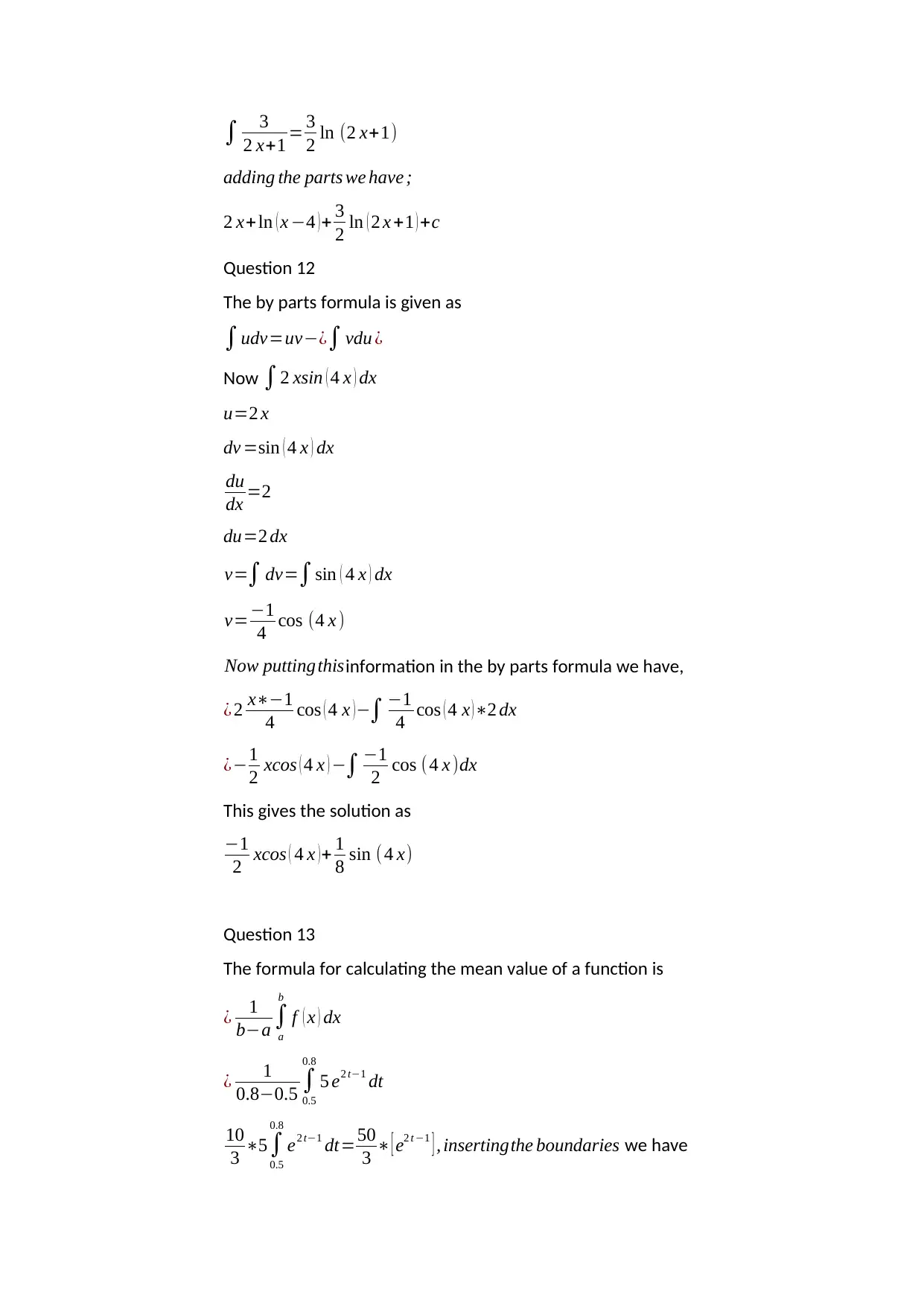
∫ 3
2 x+1 = 3
2 ln (2 x+1)
adding the parts we have ;
2 x+ ln ( x −4 )+ 3
2 ln ( 2 x +1 ) +c
Question 12
The by parts formula is given as
∫udv=uv−¿∫ vdu ¿
Now ∫2 xsin ( 4 x ) dx
u=2 x
dv =sin ( 4 x ) dx
du
dx =2
du=2 dx
v=∫ dv=∫sin ( 4 x ) dx
v=−1
4 cos (4 x )
Now putting thisinformation in the by parts formula we have,
¿ 2 x∗−1
4 cos ( 4 x )−∫ −1
4 cos ( 4 x )∗2 dx
¿−1
2 xcos ( 4 x ) −∫ −1
2 cos (4 x )dx
This gives the solution as
−1
2 xcos ( 4 x ) + 1
8 sin ( 4 x)
Question 13
The formula for calculating the mean value of a function is
¿ 1
b−a ∫
a
b
f ( x ) dx
¿ 1
0.8−0.5 ∫
0.5
0.8
5 e2 t−1 dt
10
3 ∗5∫
0.5
0.8
e2 t−1 dt=50
3 ∗ [ e2 t −1 ] , insertingthe boundaries we have
2 x+1 = 3
2 ln (2 x+1)
adding the parts we have ;
2 x+ ln ( x −4 )+ 3
2 ln ( 2 x +1 ) +c
Question 12
The by parts formula is given as
∫udv=uv−¿∫ vdu ¿
Now ∫2 xsin ( 4 x ) dx
u=2 x
dv =sin ( 4 x ) dx
du
dx =2
du=2 dx
v=∫ dv=∫sin ( 4 x ) dx
v=−1
4 cos (4 x )
Now putting thisinformation in the by parts formula we have,
¿ 2 x∗−1
4 cos ( 4 x )−∫ −1
4 cos ( 4 x )∗2 dx
¿−1
2 xcos ( 4 x ) −∫ −1
2 cos (4 x )dx
This gives the solution as
−1
2 xcos ( 4 x ) + 1
8 sin ( 4 x)
Question 13
The formula for calculating the mean value of a function is
¿ 1
b−a ∫
a
b
f ( x ) dx
¿ 1
0.8−0.5 ∫
0.5
0.8
5 e2 t−1 dt
10
3 ∗5∫
0.5
0.8
e2 t−1 dt=50
3 ∗ [ e2 t −1 ] , insertingthe boundaries we have
Paraphrase This Document
Need a fresh take? Get an instant paraphrase of this document with our AI Paraphraser
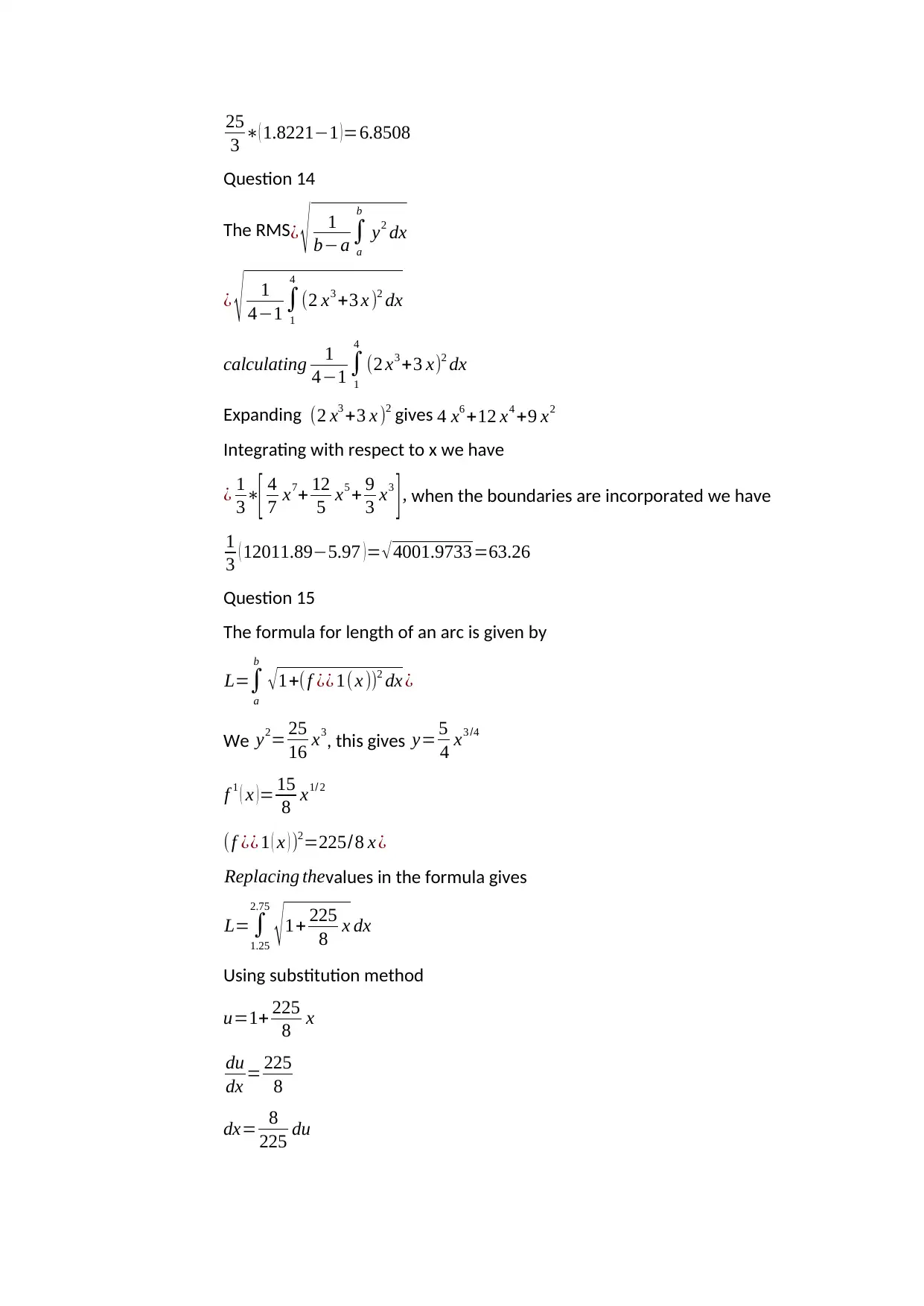
25
3 ∗( 1.8221−1 )=6.8508
Question 14
The RMS¿ √ 1
b−a ∫
a
b
y2 dx
¿ √ 1
4−1 ∫
1
4
(2 x3 +3 x )2 dx
calculating 1
4−1 ∫
1
4
(2 x3 +3 x)2 dx
Expanding (2 x3 +3 x )2 gives 4 x6 +12 x4 +9 x2
Integrating with respect to x we have
¿ 1
3∗
[ 4
7 x7+ 12
5 x5 + 9
3 x3
] , when the boundaries are incorporated we have
1
3 ( 12011.89−5.97 )= √4001.9733=63.26
Question 15
The formula for length of an arc is given by
L=∫
a
b
√ 1+(f ¿¿ 1( x ))2 dx ¿
We y2= 25
16 x3, this gives y= 5
4 x3 /4
f 1 ( x )= 15
8 x1/ 2
(f ¿¿ 1 ( x ) )2=225/ 8 x ¿
Replacing thevalues in the formula gives
L= ∫
1.25
2.75
√1+ 225
8 x dx
Using substitution method
u=1+ 225
8 x
du
dx = 225
8
dx= 8
225 du
3 ∗( 1.8221−1 )=6.8508
Question 14
The RMS¿ √ 1
b−a ∫
a
b
y2 dx
¿ √ 1
4−1 ∫
1
4
(2 x3 +3 x )2 dx
calculating 1
4−1 ∫
1
4
(2 x3 +3 x)2 dx
Expanding (2 x3 +3 x )2 gives 4 x6 +12 x4 +9 x2
Integrating with respect to x we have
¿ 1
3∗
[ 4
7 x7+ 12
5 x5 + 9
3 x3
] , when the boundaries are incorporated we have
1
3 ( 12011.89−5.97 )= √4001.9733=63.26
Question 15
The formula for length of an arc is given by
L=∫
a
b
√ 1+(f ¿¿ 1( x ))2 dx ¿
We y2= 25
16 x3, this gives y= 5
4 x3 /4
f 1 ( x )= 15
8 x1/ 2
(f ¿¿ 1 ( x ) )2=225/ 8 x ¿
Replacing thevalues in the formula gives
L= ∫
1.25
2.75
√1+ 225
8 x dx
Using substitution method
u=1+ 225
8 x
du
dx = 225
8
dx= 8
225 du
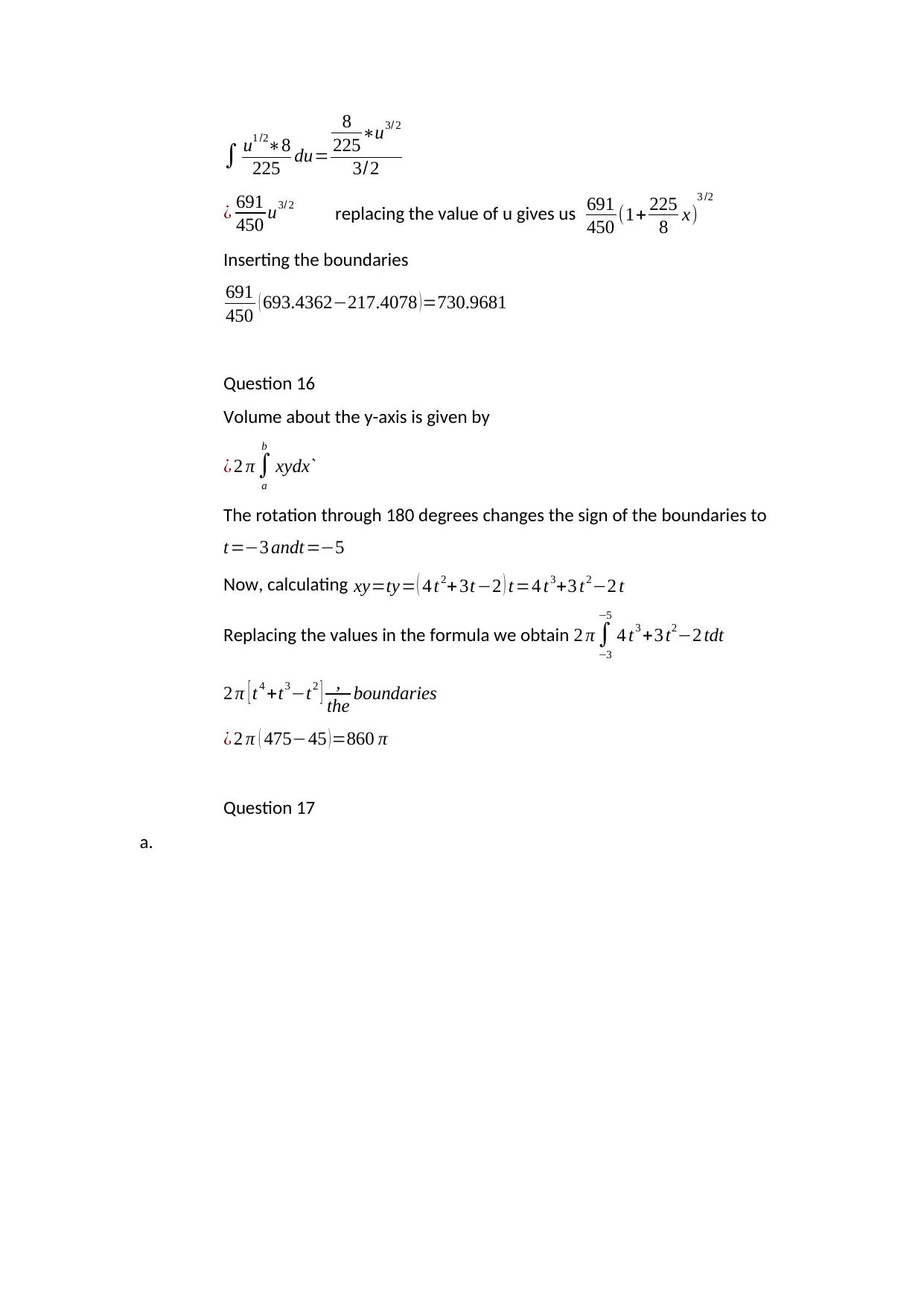
∫ u1 /2∗8
225 du=
8
225∗u3/ 2
3/2
¿ 691
450 u3/ 2 replacing the value of u gives us 691
450 (1+ 225
8 x)
3 /2
Inserting the boundaries
691
450 ( 693.4362−217.4078 )=730.9681
Question 16
Volume about the y-axis is given by
¿ 2 π ∫
a
b
xydx`
The rotation through 180 degrees changes the sign of the boundaries to
t=−3 andt =−5
Now, calculating xy=ty= ( 4 t2+3t−2 ) t=4 t3+3 t2−2 t
Replacing the values in the formula we obtain 2 π ∫
−3
−5
4 t3 +3 t2−2 tdt
2 π [ t4 +t3−t2 ] ,
the boundaries
¿ 2 π ( 475−45 )=860 π
Question 17
a.
225 du=
8
225∗u3/ 2
3/2
¿ 691
450 u3/ 2 replacing the value of u gives us 691
450 (1+ 225
8 x)
3 /2
Inserting the boundaries
691
450 ( 693.4362−217.4078 )=730.9681
Question 16
Volume about the y-axis is given by
¿ 2 π ∫
a
b
xydx`
The rotation through 180 degrees changes the sign of the boundaries to
t=−3 andt =−5
Now, calculating xy=ty= ( 4 t2+3t−2 ) t=4 t3+3 t2−2 t
Replacing the values in the formula we obtain 2 π ∫
−3
−5
4 t3 +3 t2−2 tdt
2 π [ t4 +t3−t2 ] ,
the boundaries
¿ 2 π ( 475−45 )=860 π
Question 17
a.
⊘ This is a preview!⊘
Do you want full access?
Subscribe today to unlock all pages.

Trusted by 1+ million students worldwide
1 out of 26
Related Documents
Your All-in-One AI-Powered Toolkit for Academic Success.
+13062052269
info@desklib.com
Available 24*7 on WhatsApp / Email
![[object Object]](/_next/static/media/star-bottom.7253800d.svg)
Unlock your academic potential
Copyright © 2020–2026 A2Z Services. All Rights Reserved. Developed and managed by ZUCOL.


![MATH130: Algebra Assignment 2 Solution - [University Name] - May 2019](/_next/image/?url=https%3A%2F%2Fdesklib.com%2Fmedia%2Fimages%2Fmf%2Ff5e9dd638f934d7d8421c8edf334793d.jpg&w=256&q=75)


